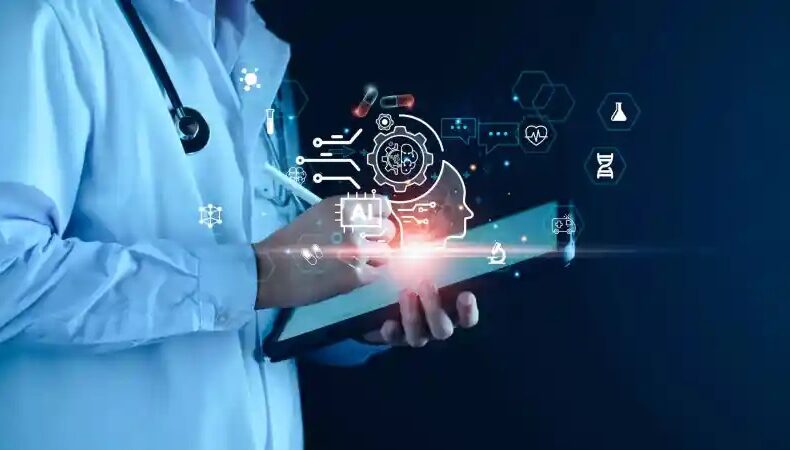
Artificial intelligence (AI in healthcare) is reshaping the medical industry, offering groundbreaking advancements in diagnostics, treatment, and patient care. By automating complex tasks, analyzing vast amounts of data, and providing predictive insights, AI helps healthcare professionals make more accurate decisions faster than ever. These advancements are not only streamlining workflows but also enhancing patient outcomes and quality of care. Here, we explore the top trends in AI in healthcare and the impact of these technologies on the future of medical innovation.
1. Enhanced Diagnostics and Predictive Analytics
In recent years, AI in healthcare has significantly improved diagnostics through machine learning and predictive analytics. AI algorithms process large datasets, including medical images, patient histories, and genetic information, to identify patterns that are often invisible to human eyes. AI-powered diagnostic tools are currently used to detect conditions such as cancer, cardiovascular diseases, and neurological disorders at early stages, leading to timely interventions and better patient outcomes.
Predictive analytics, fueled by AI development, allows healthcare providers to anticipate patient needs, foresee complications, and customize treatment plans. The rise of predictive AI is encouraging hospitals to adopt more advanced data analysis tools that help physicians make data-driven decisions, reducing misdiagnosis and improving overall patient care.
2. Virtual Health Assistants and Chatbots
Virtual health assistants and chatbots are rapidly transforming how patients interact with healthcare providers. These AI-driven tools offer 24/7 support, answering patient queries, scheduling appointments, and providing medication reminders. Virtual assistants can also monitor symptoms, analyze data, and give patients basic health advice, enhancing their access to medical support.
For hospitals and clinics, these assistants reduce the burden on staff and improve efficiency. They streamline workflows, enabling healthcare professionals to focus on more complex tasks. Software Development Companies in India and other regions are developing specialized AI models to handle patient engagement and administrative duties, making healthcare more accessible and efficient.
3. AI in Medical Imaging and Radiology
Medical imaging is one of the most impactful fields for AI in healthcare. AI algorithms process and interpret complex medical images faster and with greater accuracy than traditional methods. For instance, deep learning models can analyze X-rays, MRIs, and CT scans to detect diseases, such as tumors, with a high level of precision.
Radiologists benefit greatly from these AI tools, as they can expedite image analysis, lower the risk of human error, and increase diagnostic accuracy. By using AI to assist in reading medical images, healthcare professionals are making quicker, more accurate diagnoses, ultimately improving patient outcomes. This trend will continue to expand as AI development services in USA and other tech-driven nations push the boundaries of AI applications in radiology.
4. Personalized Treatment Plans
One of the most promising applications of AI in healthcare is the development of personalized treatment plans. AI analyzes patient data, including genetics, lifestyle, and medical history, to recommend customized treatment options. This approach, known as precision medicine, has transformed patient care by tailoring interventions to individual needs.
AI-driven precision medicine helps to determine the most effective treatments with minimal side effects. For example, cancer patients can receive tailored therapies based on their genetic makeup, enhancing treatment efficacy. With an increasing number of software development companies in India focusing on AI for personalized medicine, we can expect further advancements that improve treatment success rates and quality of life for patients.
5. Robotic Surgery and Minimally Invasive Procedures
Robotic surgery, assisted by AI, has become a major trend in modern healthcare. Robotic systems equipped with AI capabilities assist surgeons in performing minimally invasive procedures with precision and control. These robotic systems analyze and process real-time data to make movements more precise, minimizing the risk of human error.
AI-powered robotic surgery improves patient outcomes, reduces recovery times, and lowers the chances of complications. Leading AI development companies in the USA are focusing on enhancing robotic systems for surgery, indicating that this trend will continue to evolve, bringing greater efficiency and accuracy to operating rooms.
6. AI-Powered Drug Discovery
Drug discovery is traditionally a time-consuming and costly process, often taking years to develop a new drug. AI has transformed this field by analyzing vast datasets to identify potential drug candidates faster. Machine learning models can predict how different compounds will interact with biological systems, accelerating the discovery and testing phases.
As AI in drug discovery continues to advance, we’ll see faster approval times and more effective treatments entering the market. By reducing the time and costs associated with bringing new drugs to patients, AI plays a crucial role in addressing unmet medical needs.
You May Like Also: Taxi Booking App Development Cost Guide:
7. Predictive Maintenance for Medical Equipment
AI is also making a mark in maintaining and managing medical equipment. Predictive maintenance uses AI algorithms to analyze equipment data, identify potential issues, and predict when maintenance is needed. This proactive approach minimizes equipment downtime, reduces costs, and ensures that critical devices are always ready for use.
Hospitals rely heavily on diagnostic and monitoring equipment, so the benefits of predictive maintenance extend to improved patient care and operational efficiency. Software development companies in India are increasingly offering AI-powered maintenance solutions, highlighting the role of AI in supporting healthcare infrastructure.
8. Remote Patient Monitoring and Telemedicine
The demand for remote healthcare services has surged in recent years, and AI in healthcare is playing a pivotal role in this shift. AI-powered remote patient monitoring allows healthcare providers to track patients’ vital signs and health conditions remotely. This technology is particularly beneficial for managing chronic conditions, enabling timely interventions without requiring patients to visit healthcare facilities.
Telemedicine has also been enhanced by AI, which allows for advanced diagnostics and treatment recommendations remotely. Remote monitoring and telemedicine have made healthcare more accessible, especially for patients in rural areas, further emphasizing the transformative role of AI.
Conclusion
The rise of AI in healthcare is revolutionizing medical technology, driving innovations that improve diagnostics, streamline treatment, and enhance patient outcomes. From predictive analytics and robotic surgery to virtual assistants and personalized medicine, AI is transforming every aspect of healthcare. As a software development company in India continues advancing these technologies, the future of healthcare will become increasingly efficient, accessible, and personalized.
Incorporating AI in healthcare not only enables better patient care but also fosters a proactive approach to managing health. With AI’s potential to automate complex processes, provide data-driven insights, and enhance medical precision, the industry is on the verge of a digital transformation that promises significant benefits for both patients and providers.






